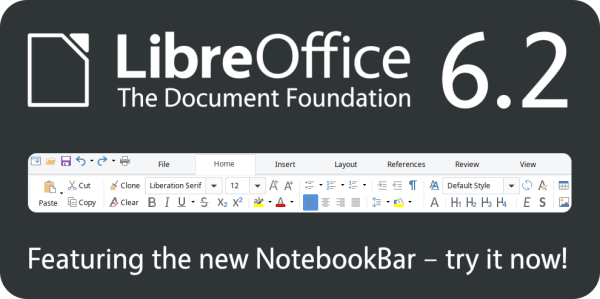Yesterday The Document Foundation (TDF) announced the release of LibreOffice 6.2, a significant major release of the free and open source office suite which features a radical new approach to the user interface – based on the MUFFIN concept – and provides user experience options to meet all users’ preferences.

The NotebookBar is available in Tabbed, Grouped and Contextual versions. Each one has a different approach to the menu layout and complements the traditional Toolbars and Sidebar. The Tabbed variant aims to provide a familiar interface for users coming from suites such as MS Office and is supposed to be used primarily without the sidebar, while the Grouped one allows to access “first-level” functions with one click and “second-level” functions with a maximum of two clicks.
The design community has also made substantial changes and improvements to icon themes, in particular Elementary and Karasa Jaga.
LibreOffice 6.2 new and improved features
- The help system offers faster filtering of index keywords, highlighting search terms as they are typed and displaying results based on the selected module.
- Context menus have been tidied up, to be more consistent across the different components in the suite.
- Change tracking performances have been dramatically improved, especially in large documents.
- In Writer, it is now possible to copy spreadsheet data into tables instead of just inserting them as objects.
- In Calc it is now possible to do multivariate regression analysis using the regression tool. In addition, many more statistical measures are now available in the analysis output and the new REGEX function has been added, to match text against a regular expression and optionally replace it.
- In Impress and Draw the motion path of animations can now be modified by dragging its control points. In addition, a couple of text-related drawing styles have been added, as well as a Format Table submenu in Draw.
- LibreOffice Online, the cloud-based version of the suite, includes many improvements too. On mobile devices, the user interface has been simplified, with better responsiveness and updates to the on-screen keyboard.
As with every major and minor release of LibreOffice, interoperability with proprietary file formats has also been improved for better compatibility with Office documents, including old versions which have been dropped by Microsoft. The focus has been on charts, animations and document security features. To assist with interoperability, LibreOffice 6.2 is built with document conversion libraries from the Document Liberation Project.
LibreOffice 6.2’s new features have been developed by a large community of contributors: 74% of commits are from developers employed by companies on the TDF’s the Advisory Board, such as Collabora, Red Hat and CIB and by other contributors such as the City of Munich. Individual volunteers account for 26% of commits.
In addition, there is a global community of individual volunteers taking care of quality assurance, software localization, user interface design and user experience, editing the help pages and documentation.
LibreOffice 6.1.5 for commercial deployments
The Document Foundation has also released LibreOffice 6.1.5, a more mature version which includes some months of back-ported fixes and is better suited for commercial deployments, where features are less important as individual productivity is the main objective.
Companies wishing to deploy LibreOffice are advised to seek assistance for such matters as software support, migrations and training from qualified professionals.
Download LibreOffice 6.2 or LibreOffice 6.1.5
LibreOffice 6.2 and LibreOffice 6.1.5 are now available for immediate download. Builds of the latest LibreOffice Online source code are also available, released as Docker images.
LibreOffice Online is fundamentally a server service and should be installed and configured by adding cloud storage and an SSL certificate. It might be considered an enabling technology for the cloud services offered by ISPs or the private cloud of enterprises and large organisations.
LibreOffice users, free software advocates and community members are encouraged to support The Document Foundation with a donation.